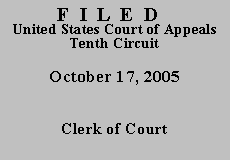

| UNITED STATES OF AMERICA,
v.
BRYAN W. MILES |
No. 05-3001
(D.C. No. 03-10172-01 JTM) (D. Kan.) |
If counsel conscientiously examines a case and determines that any appeal would be wholly frivolous, Anders authorizes counsel to so advise the court and request permission to withdraw. Counsel must submit a brief to both the appellate court and the client pointing to anything in the record that would potentially present an appealable issue. The client may then choose to offer any argument to the court. If the court, upon completely examining the record, determines that the appeal is in fact frivolous, it may grant counsel's request to withdraw and dismiss the appeal. Id. at 744. In the present case, counsel, acting pursuant to Anders, provided Miles with a copy of his appellate brief and Miles has not filed a pro se brief raising any argument. The sole issue raised on appeal is whether the evidence was sufficient to support a finding of guilt by the jury.
"[I]n reviewing the sufficiency of the evidence to support a jury verdict, this court must review the record de novo and ask only whether taking the evidence both direct and circumstantial, together with the reasonable inferences to be drawn therefrom in the light most favorable to the government, a reasonable jury could find the defendant guilty beyond a reasonable doubt." United States v. Hanzlicek, 187 F.3d 1228, 1239 (10th Cir. 1999).
A careful review of the record reveals that the government's evidence meets this standard. Miles was apprehended shortly after exchanging counterfeit Federal Reserve Notes for genuine currency at a local tavern in Wichita, Kansas. In the first exchange, Miles purchased three drinks, each with different $20 counterfeit notes. Next, Miles obtained sixty genuine $1 notes in exchange for three counterfeit $20 notes. Finally, Miles attempted to exchange a counterfeit $100 note, but this time met with resistance: the bartender explained he could not change such a large amount. Miles was undeterred, and proposed the bartender keep $50 as a "tip." This generous gratuity aroused the bartender's suspicions, at which point he began questioning Miles about the notes. Miles responded by running out of the bar.
Miles' defense that he did not know the bills were counterfeit could have been rejected by a reasonable jury based on the suspicious manner in which Miles passed the forged obligations. Accordingly, because Miles has no meritorious grounds for appeal, we GRANT counsel's request to withdraw and AFFIRM.
ENTERED FOR THE COURT
Carlos F. Lucero
Circuit Judge
*.The case is unanimously ordered submitted without oral argument pursuant to Fed. R. App. P. 34(a)(2) and 10th Cir. R. 34.1(G). This order and judgment is not binding precedent, except under the doctrines of law of the case, res judicata, and collateral estoppel. The court generally disfavors the citation of orders and judgments; nevertheless, an order and judgment may be cited under the terms and conditions of 10th Cir. R. 36.3.